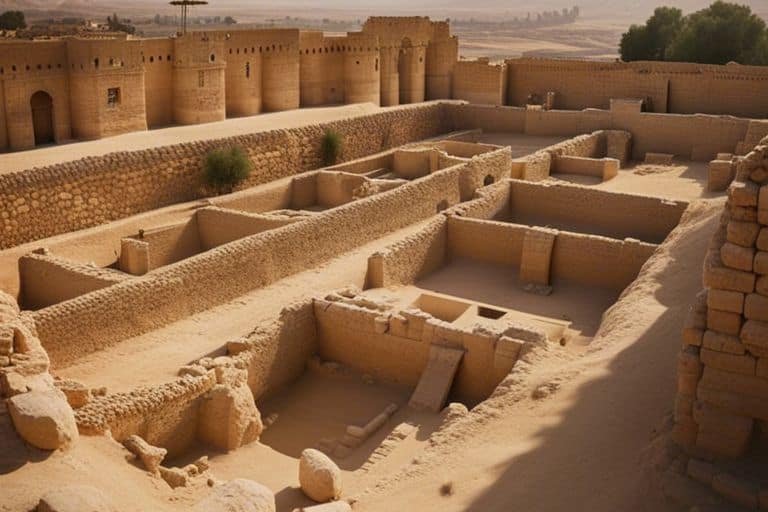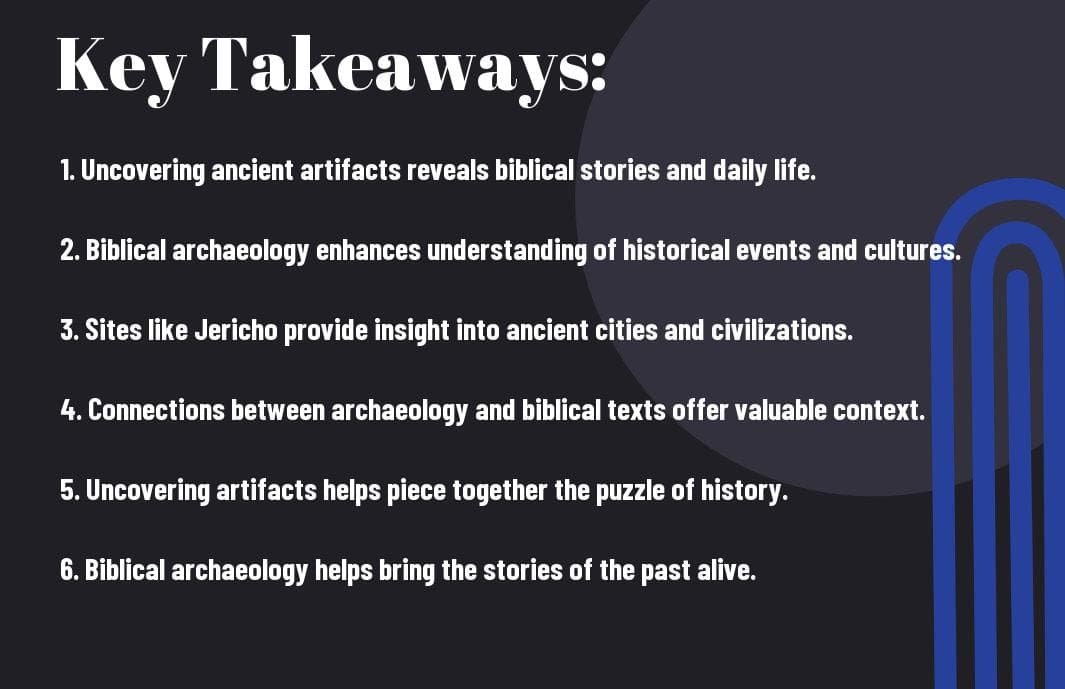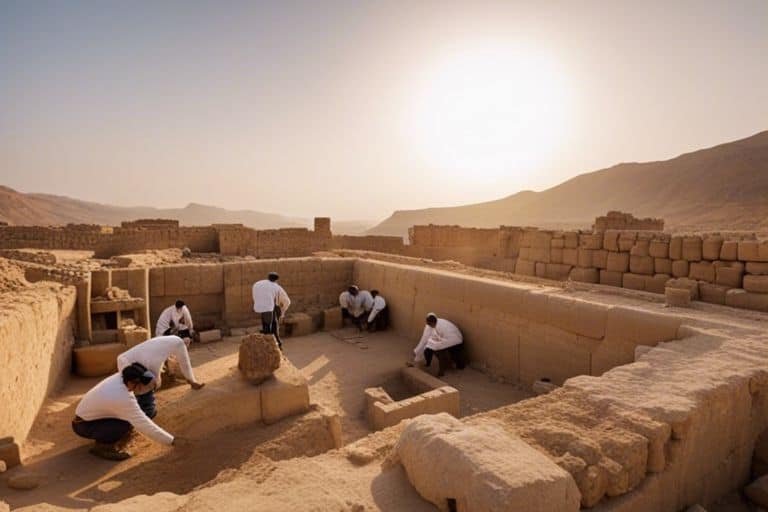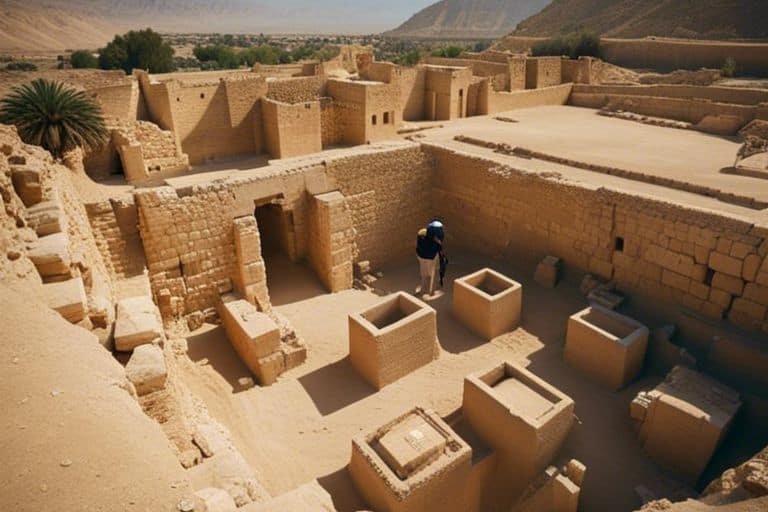There’s a world beneath the surface waiting to be uncovered in Biblical archaeology. From unearthing ancient artifacts to unlocking mysteries of the past, this fascinating field offers a unique glimpse into the history and culture of biblical times. In this blog post, we will examine into the exciting discoveries at the ancient city of Jericho, known as the oldest continuously inhabited city in the world. Join us on a journey through time as we explore the rich tapestry of archaeological findings that bring the stories of the Bible to life.
Key Takeaways:
- Interdisciplinary Field: Biblical archaeology involves the collaboration of archaeologists, historians, biblical scholars, and other experts to study and interpret ancient artifacts and sites mentioned in the Bible.
- Physical Evidence of Bible Stories: Discoveries in biblical archaeology provide physical evidence that supports and sheds light on various events and figures mentioned in the Bible, helping to better understand the historical context of those narratives.
- Cultural and Historical Insights: Biblical archaeology not only uncovers the material remnants of ancient civilizations but also provides valuable insights into the customs, beliefs, and everyday lives of people who lived during biblical times.


Historical Context of Jericho
Jericho in the Biblical Narrative
Any discussion about the history of Jericho must begin with its prominent place in the Biblical narrative. The city is famously known for its mention in the Book of Joshua, where the walls of Jericho came tumbling down after the Israelites encircled it seven times. This event is one of the most iconic stories in the Old Testament, solidifying Jericho’s significance in biblical history.
Archaeological Timelines
Timelines of archaeological excavations in Jericho reveal a rich history that spans thousands of years. It is one of the oldest continuously inhabited cities in the world, with evidence of settlement dating back to around 9000 BCE. Excavations have uncovered layers of civilizations, providing valuable insights into the development of urban life, trade networks, and cultural exchange in the ancient Near East.
It is crucial to note that archaeological timelines in Jericho also shed light on the periods of destruction and rebuilding the city endured. These layers of destruction can be attributed to various factors, including warfare, natural disasters, and the shifting political landscape of the region.

Methodologies in Biblical Archaeology
Excavation Techniques
For biblical archaeologists, excavation is a crucial method for uncovering ancient artifacts and understanding the historical context of biblical events. Excavation techniques involve carefully removing layers of soil and debris to reveal structures, artifacts, and other important remains. These methods require patience, precision, and attention to detail to ensure that the integrity of the site is maintained.
Dating and Analyzing Artifacts
The dating and analysis of artifacts play a vital role in biblical archaeology, helping researchers determine the age and significance of discoveries. The use of various dating techniques such as carbon dating, pottery analysis, and stratigraphy allows archaeologists to piece together the timeline of a site with remarkable accuracy. Through careful analysis, researchers can gain insights into ancient cultures, trade routes, and religious practices.
This method is necessary for establishing the historical context of artifacts and understanding their relevance to biblical narratives. By combining scientific dating methods with detailed artifact analysis, biblical archaeologists can accurately interpret the significance of their findings and contribute to our understanding of the ancient world.
Discoveries and Controversies
The Walls of Jericho: Fact and Fiction
Despite the legendary account in the Bible of the walls of Jericho falling at the sound of trumpets, archaeological evidence has posed questions about the accuracy of this event. To date, no conclusive evidence has been found to prove or disprove the story. Some researchers argue that the destruction layers do not align with the biblical timeline while others suggest the possibility of symbolic rather than literal interpretation.
Notable Finds and Debates in Jericho Archaeology
Debates in Jericho archaeology have revolved around significant findings and interpretations. Debates surround the dating of the famous Jericho tower, with some scholars proposing a much earlier date than previously thought. The discovery of a plastered skull in one of the tombs has also sparked controversy, with differing theories on its significance and ritual practices.
Discoveries in Jericho archaeology have unveiled a wealth of information about ancient civilizations, including evidence of complex social structures, advanced urban planning, and strategic fortifications. Despite ongoing controversies and debates, these excavations continue to provide invaluable insights into the history and development of one of the oldest known cities in the world.
Impact on Modern Understanding
Theological Implications
On unlike many other archaeological discoveries, the findings in Jericho have profound theological implications. The excavation of this ancient city has provided tangible evidence that aligns with accounts found in the Bible, reaffirming the historical accuracy of certain events.
Historical Insights
For centuries, Jericho has been a site of both mystery and controversy. Archaeological digs have uncovered layers of civilizations that date back thousands of years, shedding light on the complex history of this region. The discoveries at Jericho have not only confirmed the existence of ancient cities mentioned in historical texts but have also challenged previous assumptions about the timeline of events.
Theological implications probe into the religious significance of the discoveries at Jericho, reinforcing the faith of believers and sparking debates among scholars. The historical insights gained from excavations at Jericho have reshaped our understanding of ancient civilizations in the region, offering a tangible connection to the past that was previously only found in scripture.
Conclusion
Upon reflecting on the intricacies and discoveries unearthed in the fascinating world of Biblical Archaeology, one cannot help but be in awe of the stories and mysteries that have been brought to light. The journey to Jericho has been a pivotal one, shedding light on ancient civilizations and giving us a deeper understanding of the historical events that have shaped our world. While the exploration of Biblical sites continues to enrich our knowledge, it also raises questions and challenges that invite further study and contemplation. To investigate deeper into the complexities surrounding Jericho, check out The Trouble with Jericho for more insights.
FAQ
Q: What is Biblical Archaeology?
A: Biblical Archaeology is the study of archaeological remains and artifacts in order to understand and interpret the historical and cultural context of the events and people mentioned in the Bible.
Q: What is the significance of Biblical Archaeology?
A: Biblical Archaeology helps to provide tangible evidence and insights into the historical accuracy of the Bible, as well as shedding light on the customs, practices, and events of ancient times.
Q: How are archaeological sites related to the Bible discovered?
A: Archaeological sites related to the Bible are discovered through a combination of historical records, geographical clues, satellite imagery, and on-the-ground excavations led by trained archaeologists.
Q: What are some key discoveries in Biblical Archaeology?
A: Some key discoveries in Biblical Archaeology include the Dead Sea Scrolls, the city of Jericho, the city of Petra, the city of Nineveh, and various artifacts and inscriptions that corroborate biblical accounts.
Q: How can I learn more about Biblical Archaeology?
A: You can learn more about Biblical Archaeology through books, documentaries, online resources, visiting archaeological sites and museums, and attending lectures and seminars by scholars in the field.



